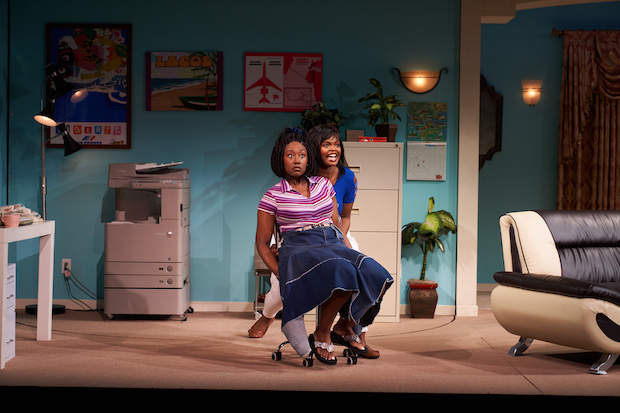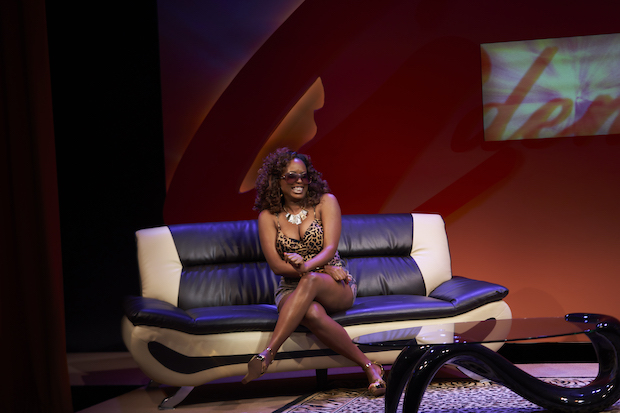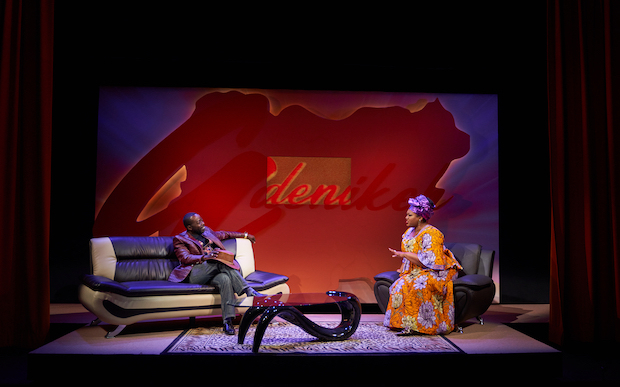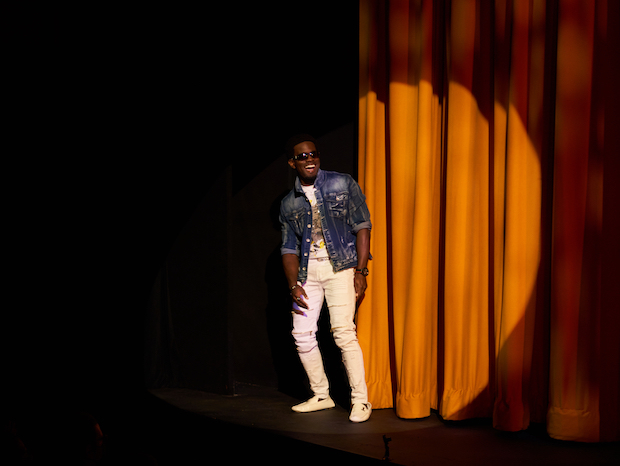Review: In Nollywood Dreams, Two Women Fight to Star in a Direct-to-Video Movie
Jocelyn Bioh’s new comedy sends up Nigerian cinema in the early ’90s.

(© Daniel J. Vasquez)
Much ink has been spilled about the chasm between social media and reality: That "influencer" who seems to wake up every morning on the beach is actually putting old photos on timer while occupying a basement apartment in Queens. But such dishonest self-promotion isn't a new invention. In fact, it might have been easier to mask the truth in the time before everyone carried around a movie studio in their phone. That's certainly the case for the characters populating Jocelyn Bioh's comedy, Nollywood Dreams, now reopening MCC Theater with gales of laughter.
It is set in Lagos in the early '90s, when direct-to-video movies were all the rage in Nigerian cinema. Gbenga Ezie (Charlie Hudson III) is a big-shot director who allegedly turned down several American offers in order to produce his new movie, The Comfort Zone, in his native Nigeria. But who will play the lead role of Comfort Aleshinloye, long-suffering wife to a no-good cheater who has gone to study film in New York? The obvious choice would be established Nollywood actress Fayola Ogunleye (Emana Rachelle), but her star has been on the wane for years. What if Gbenga takes a risk on Ayamma Okafor (Sandra Okuboyejo), a fresh face presently languishing at her parents' travel agency? It only sweetens the deal that whoever gets this role will star opposite heartthrob Wale Owusu (Ade Otukoya). Let the backstage backstabbing begin.

(© Daniel J. Vasquez)
If that description has led you to expect Nigeria's answer to All About Eve or Showgirls, I apologize. Nollywood Dreams never climbs to the summit camp of those classics, although Bioh allows us to glimpse down several pathways by which it could: Who exactly did Gbenga meet in America, and how autobiographical is his screenplay? What role does publicity play in his decision? And why would Fayola bring up the specter of the "Nigerian Prince" e-mail scam in relation to Gbenga's work, suggesting that his films are just a front for a more lucrative business? Unfortunately, Bioh leaves these as open questions, never allowing the comic stakes to mount before the central conflict is settled by a deus ex machina. It's hard not to feel a little disappointed by the squandered potential.
And yet what Bioh does well, she does really well, which is to dramatize the interplay between West African lives and the cultural hegemony of the United States. In her 2017 play, School Girls; or, The African Mean Girls Play that meant reversing the formula of the Tina Fey movie to comment on the Western notions of beauty exported to Africa. Here, it is about the fibs immigrants tell the folks back home to justify their decision to move, and the suspicion of the diaspora this engenders.

(© Daniel J. Vasquez)
Nowhere is that story clearer than during frequent interviews with Adenikeh, Nigeria's queen of daytime talk. As deliciously portrayed by Abena, she's a cross between Oprah Winfrey and Robin Leach, a posh lilt to her voice lubricating the passage of her next impertinent question. When Gbenga mentions that he felt artistically constricted in America, she leans in with a ravenous follow-up, eager to hear a vindication of her own decision to stay a big fish in Nigeria. And yet Gbenga's mere proximity to America, several years about which he is not being very honest, gives him cachet as Nigeria's hottest young director. Bioh and director Saheem Ali capture this love-hate dynamic with clarity and precision.
Bioh also provides the actors sturdy platforms in the characters she writes. Nana Mensah makes a riotous turn as Ayamma's sister, Dede. From the opening moment of the play, when we see her squeezing great gobs of honey into her tea, we know she's going to be a trip. Okuboyejo's Ayamma is sweet, but perhaps more ambitious than she lets on. Donning an ever-changing array of wigs (by Nikiya Mathis) and outlandish outfits (by Dede Ayite), Rachelle's Fayola has long relinquished any pretense of modesty. She's not here to make friends; she's here to win. The performers keep us laughing throughout, grounding their characters' eccentricities in real objectives and insecurities.

(© Daniel J. Vasquez)
The design supports and enhances already funny performances: Arnulfo Maldonado's set delivers bougie '90s realness while transforming into a variety of locations. David Weiner and Jiyoun Chang easily facilitate those transformations through lighting. And projection designer Alex Basco Koch has spliced together a truly hilarious trailer for The Comfort Zone.
Nollywood Dreams isn't the sidesplitting comedy of the year, but it will keep you laughing throughout an amusing and zippy 90 minutes.









